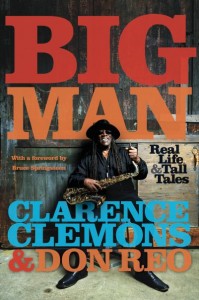 One thing you learn pretty early on in Springsteen saxophonist Clarence ClemonsÁ¢€â„¢ memoir Big Man (Grand Central Publishing, 400 pages, $26.99, Oct. 21) is that youÁ¢€â„¢re not going to be reading any of the real juicy stuff.
One thing you learn pretty early on in Springsteen saxophonist Clarence ClemonsÁ¢€â„¢ memoir Big Man (Grand Central Publishing, 400 pages, $26.99, Oct. 21) is that youÁ¢€â„¢re not going to be reading any of the real juicy stuff.
Á¢€Å“Maybe IÁ¢€â„¢ll write a book that has all the sex-and-drugs stories from the early years and publish it after all of us are dead,Á¢€ Clemons writes. Á¢€Å“Nah, I canÁ¢€â„¢t do that either, Á¢€â„¢cause now all of us have kids and grandkids.Á¢€
But beyond the fact that you know a lot got left out of Big Man Á¢€” a nickname Clemons says came not from Springsteen but from a little old lady in BloomingdaleÁ¢€â„¢s Á¢€” thereÁ¢€â„¢s another complicating factor: A lot of the stuff in it never even happened. Clemons and his writing partner Don Reo label a good number of the chapters Á¢€Å“Legends,Á¢€ and promise that those sections include Á¢€Å“some fact and a lot of fiction.Á¢€ ItÁ¢€â„¢s unorthodox, but just think of the trouble James Frey could have saved himself if heÁ¢€â„¢d included the same warning.
Still, youÁ¢€â„¢ve got to read between a lot of lines to get the complete picture of Clarence Clemons from Big Man, since the way itÁ¢€â„¢s written relies less on historical fact and more on the personality of its subject. Fortunately, Clemons has plenty of that to spare.
In fact, the stories (both real and imagined) paint a vivid picture of a gregarious, grateful and complicated man who loves music the way some people love God or women or their own children, although Clarence loves those things plenty as well. HeÁ¢€â„¢s spiritual but foul-mouthed, and a womanizer whoÁ¢€â„¢s managed to remain close to all his exes, which says something about the confidence and affability of the man behind the horn.
But just because this isnÁ¢€â„¢t a traditional memoir doesnÁ¢€â„¢t mean it doesnÁ¢€â„¢t contain some big reveals. The story about Robert De Niro confiding that he stole his Á¢€Å“You talkinÁ¢€â„¢ to me?Á¢€ bit from something Springsteen said on stage is one classic moment. Clemons also comes clean about a much-publicized incident at this yearÁ¢€â„¢s Super Bowl halftime show: That’s right, Springsteen’s “patented knee slide” was apparently no accident.
ThatÁ¢€â„¢s funny, but the Super Bowl actually provides the narrative climax for ClarenceÁ¢€â„¢s literary journey through Big Man Á¢€” performing for the first time since his double knee replacement and in significant pain, he literally spent the whole time fearing he might tip over in front of a billion people.
The book doesnÁ¢€â„¢t sugarcoat the physical problems that Clarence has had to endure to keep playing. His knees and his back have both betrayed him in recent years, and he reveals that he even suffered a minor heart attack. But he remains (at least in writing) almost unfailingly positive Á¢€” Clemons knows heÁ¢€â„¢s lucky to have the life he has, even if he does note that if he hadnÁ¢€â„¢t met Springsteen, heÁ¢€â„¢d still be playing music, just in smaller rooms.
But they did meet, and to hear Clemons tell it, his relationship with Bruce was special from the start: Á¢€Å“IÁ¢€â„¢ll tell you something, when we started to play that night we looked into each otherÁ¢€â„¢s eyes and it was like Á¢€¦ total magic,Á¢€ he writes. Á¢€Å“My girlfriend said we were queer for each other. But it was so solid.Á¢€
Given that connection, itÁ¢€â„¢s not surprising that the period when Springsteen dismissed the E Street Band to record and tour with different musicians in the early Á¢€â„¢90s was so tough on Clemons.
In the book, Clarence describes the phone call he got from Bruce while on tour in Japan with Ringo Starr. He shares only his reaction, not SpringsteenÁ¢€â„¢s words, and describes how the scene ended with encouragement and an awkward hug from Ringo Á¢€” who of course went through his own high-profile band breakup. The chapter doesnÁ¢€â„¢t have Á¢€Å“legendÁ¢€ in the title, so we can only assume itÁ¢€â„¢s how it actually happened.
But besides those sometimes frustrating Á¢€Å“legendsÁ¢€ sections Á¢€” trying to parse the fact from fiction can be maddening, as funny and well-written as they are Á¢€” thereÁ¢€â„¢s also the contributions of Reo, a TV producer who clearly could pen a fascinating memoir in his own right. His role here, unfortunately, seems mainly to name drop and talk about how cool it is to sit right backstage during a Springsteen concert. (No kidding, Don.) A few of his sections could easily have been sheared.
That said, Reo provides a valuable glimpse of what it must be like to hang with the Big Man. Á¢€Å“He shines from within and radiates a kind of Á¢€¦ goodness,Á¢€ Reo writes of Clarence. Á¢€Å“He has the ability to distract you from the bitcheries of life.Á¢€
ThatÁ¢€â„¢s also something that Big Man the book is more than capable of doing Á¢€” along with giving you a good idea, however fleeting, of what itÁ¢€â„¢s like to be, well, the Big Man. And itÁ¢€â„¢s worth the price of admission just for that.




Comments